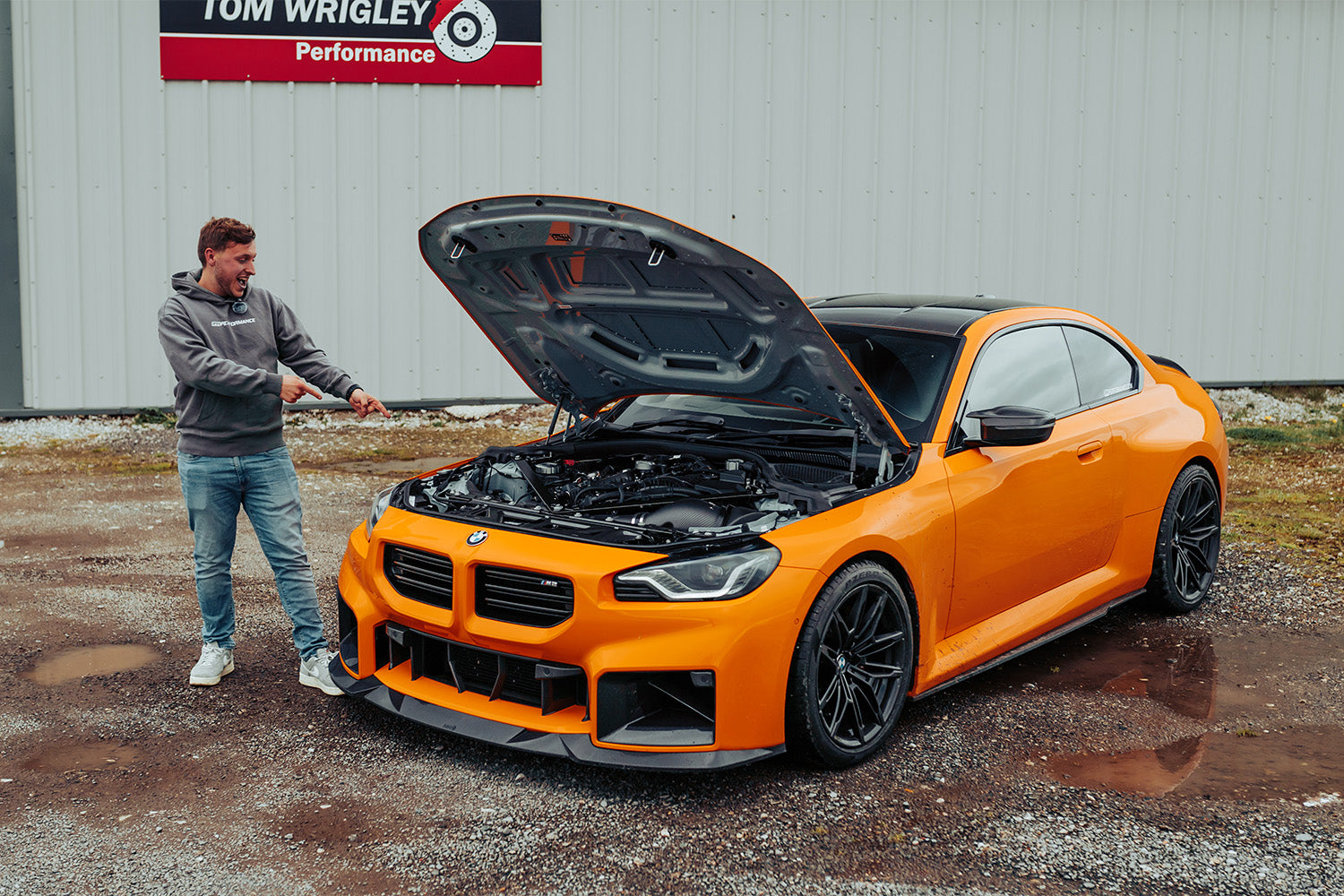BMW’s S58 engine began its life back in 2019 within the BMW F97 X3M and F98 X4M. A couple of years later, the S58 made its way into the BMW G80 M3, G82 M4 and later into the G87 M2. Since then, the S58 has garnered a very positive reputation for its performance, reliability and tunability.



Having fixed the weaknesses of the previous S55 engine - the crank hub in particular - the S58 is a tuner’s dream with over 200 horsepower gains being possible with an upgraded exhaust and a tune.
How Is The BMW S58 Engine Different From The S55?

There are a few major differences between the two engines:
One-piece crank hub
A weakness of the S55 engine is that it uses a 2-piece crank hub which has a tendency to slip. This has affected an estimated 4-5% of S55-powered BMWs with tuned cars being disproportionately affected. The crank hub spinning would throw off the timing of the engine, causing valve-to-piston contact and some not very nice ‘explodey’ noises. The only way to run high horsepower reliably is to upgrade the crank hub with an aftermarket 1-piece version.
Thankfully, the S58 engine has a 1-piece crank hub from the factory ensuring it doesn’t slip under extreme load.
Lower compression
BMW built the S58 engine with lower compression than the S55. This allows the engine to handle more boost, meaning you can turn up the pressure with software or upgraded turbochargers.
Stronger internals
Both the S55 and S58 engines feature some forged internals however, the S58 has been proven to be stronger in standard form. The S58 has forged steel conrods, forged aluminium pistons, forged camshafts and plasma-coated cylinder walls. This makes it very durable at standard power.

Better fueling
The S58 engine has a superior fueling setup to the S55 out of the box, meaning it can meet higher fueling requirements. This, combined with the lower compression, allows the S58 to make so much more power from a standard ECU remap.
How Much Power Can A Stock BMW S58 Engine Handle?

Although there is no exact figure due to other factors like quality of tune, how the car is driven and maintained, we wouldn’t recommend running any higher than 800 bhp at the crank. Although the engine may be able to handle more than this, we wouldn’t feel confident in the reliability or longevity. Who wants to drive a car that could be one pull away from disaster?

Mapping in a smooth and linear power curve as well as limiting torque in the low RPM range will certainly help protect the standard engine internals.
How We Built a BMW S58 Engine Capable Of Over 1500 bhp:
For Texas 2K25, we’re building a BMW G87 M2 xDrive drag car to compete amongst the fastest BMWs in the world. The car will have over 1400 wheel-horsepower with a 1:1 power-to-weight ratio target.
Is The BMW S58 Engine Forged?
Although the main internal components - crankshaft, pistons, conrods, camshafts - are already forged from the factory, forging is just a manufacturing process. Design & materials also play a huge role when it comes to strength. In order to achieve this level of power reliably, the majority of the engine internals need to be upgraded with stronger components.
What Engine Hardware Needs To Be Upgraded?
To make things simple, here is a list of all the internals our S58 is running:
- ARP main studs
- ARP head studs (custom age 625+)
- 5150 AutoSport CPM Carrillo Pro-Xtreme pistons
- 5150 AutoSport CPM Carrillo Pro-Xtreme rods
- 5150 AutoSport Xtreme Duty cylinder sleeves & O-rings
- 5150 AutoSport High-Performance main bearings
- 5150 AutoSport High-Performance rod bearings
- GSC billet S2 camshafts
- GSC beehive valve springs
- GSC STD intake valves
- GSC super alloy exhaust valves
- GSC intake & exhaust valve stem seals
ARP Studs


We used ARP studs on our previous 1,000 bhp G80 M3 build and they’ll be essential for our G87 project. The studs will allow a higher clamping pressure and improve stability and strength. The OEM bolts can move around a bit which puts wear on the bearings and increases the chance of failure.
Pro-Xtreme Pistons & Rods




These components are manufactured by Carrillo but built to 5150 AutoSport’s specifications. The rods take an unbelievable amount of strain, which is why upgrading to a thicker forged aluminum rod is essential. The pistons are also forged aluminum with a different strength-promoting design, as shown in the side-by-side comparison.
Xtreme Duty Cylinder Sleeves & O-Rings

To increase the strength of the block itself, we’re using heavy-duty cylinder sleeves, also from 5150 AutoSport. Installing these required machining, courtesy of SpecJ Motorsport here in the UK. The O-rings that accompany the sleeves pinch the head gasket to the head, allowing us to run high levels of boost without any lift.
GSC Billet Stage 2 Camshafts



These BMW S58 upgraded camshafts from GSC are works of art. In addition to looking amazing, these camshafts are incredibly strong, as proven on Tom Wrigley’s 1500 bhp G80 M3. In addition to being stronger, the GSC stage 2 cams have larger lobes which cause the valves to open further and for longer. The stage 3 camshafts have an even larger lobe duration however, they are largely untested at the moment which is why we’re sticking with the tried and tested S2’s for now.


Here are the exact specifications of the GSC Stage 2 Camshafts:
|
7090S2 |
ADV Duration |
Duration @ 0.040" |
Peak Lift |
Center Line |
|
Intake |
284° |
240° |
10.2mm |
Variable |
|
Exhaust |
288° |
242° |
10.8mm |
Variable |
GSC Uprated Valves


In addition to the camshafts, GSC also supplied us with their super alloy valves. Just like the other components, the valves are incredibly strong to ensure the setup copes with high levels of boost and an increased redline. The most notable difference is the design of the head which is also swirl-polished. This increases airflow by 30CFM over the standard valves.
All benefits include:
- Swirl polished heads for smoother airflow over the valve
- Back cut to reduce valve weight for higher RPM, higher boost pressure, and allow for more aggressive cam profiles without increasing valve spring seat pressures
- Valve stems are micro-polished to allow for less oil retention on the stem, which creates less drag on the stem to guide for a smoother motion
- Intake valves are a modified 21-4n stainless
- Valve tips are either hardened or have a stelite wafer tip fused so that the tip is within 5 Rockwell C of the rocker or valve tappet for extended life and less wear
- Valve tip lengths - GSC has taken extra time to adjust tip heights on the applications to require less tipping of the valve, to maintain proper tip height for proper valve train geometry, and to cut down on install times when setting valve lash
- GSC has also adjusted the keeper groove to properly balance intake and exhaust spring pressures to reduce the use of valve spring shims and maximize performance from our spring and retainer kits.
GSC Beehive Valve Springs


To support the valves, we’re running GSC’s oval valve springs with titanium retainers. The ‘beehive’ design means the coils are progressive in size, increasing strength. They also utilise advanced material heat treatment methods for superior load loss capabilities. These springs have the highest level of spring load retention while still maintaining good fatigue throughout the life of the spring. Beehive springs allow for the use of a smaller, lighter retainer allowing for higher RPM and more valve control.
Valve specifications:
- Max RPM: 9,000 RPM
- Max boost: 70 psi
- 101 lbs @ 1.415" install height
- 221lbs @ 0.982" (11mm Valve Lift)
Their primary function is to prevent what’s known as valve float. This is where high levels of boost cause the valves to push open as the spring doesn’t have enough resistance.
GSC Valve Stem Seals

Lastly, GSC Power-Division Viton® valve seals provide improved resistance to high temperatures, fuel, and chemical contaminants as well as extended wear as seen in high rpm engines. These are the last pieces to the puzzle and round up the engine hardware we’re using to achieve over 1500 bhp in our BMW G87 M2’s S58 engine.
We’re aware that, for those who aren’t deep within the BMW tuning community, finding a reliable source of both engine parts and advice can be difficult. R44 Performance is now an authorised supplier of all the engine components listed above and much more. If you require any help or advice about which components would be best for your application, get in touch with our sales team.



